|
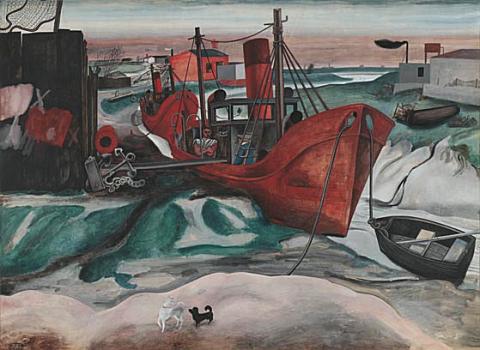
Home Again
Edward Burra
_______________________
Age of Holes
Joe Fletcher
I push along a dirt road slicing through a cold russet meadow of spiked wheat, littered with wren twitter and the dried corpses of voles. Then a forest where the road bends left.
Then a wooden series of poor shop fronts joining ramshackle buildings. Within: languor, mothballs, clothes dangling from racks like slaughterhouse skins. I move through that tawdry museum. Ladies behind counters watch with indifference, eating orange food from styrofoam containers. My mother sadly picks the flesh of a herring from its bones. Her head is bowed, as if not wanting to reveal to me her shame, her disappointment. Children push parents into their graves.
Then a shelf of photographs of boys at various ages. I am told that all of them are me, that I leave a trail of photographic husks in my wake to be marveled at by a wave of identity pushing through flesh. But those boys are a lie. They are impossibly small and in the landscape of the photographs light passes through them; they cast no shadow. Nor do the photographs themselves. I reach behind one of them and feel something warm and flowing....(more)
Painted Bride Quarterly 82
_______________________

Helen Levitt
1 2 3
_______________________
Apostle of impassioned sincerity: My Struggle by Karl Ove Knausgaard
Steve Mitchelmore
This Space
(....)
The immense and visceral detail describing Karl Ove’s family and friends has contributed to the news media controversy surrounding the book and will no doubt detract from the necessity of its form, as will summarising the face-in-the-sea experience as “religious” or “mystical”. Like his grand amour for a girl called Hanne, it is the everyday unknown. Also in the same movement of distraction, Proust is invoked as the main precursor, though only Boyd Tonkin has singled out the reason as Knausgaard’s “microscopically detailed account of how [the book] came to be written”. The other major influence would seem to be Thomas Bernhard, whose father also died in mysterious circumstances and who also describes each turn of his life with preternatural precision. The collective title of his great five-book memoir Gathering Evidence is a good pointer as to why, as well as Knausgaard’s expressed admiration. The author’s need to understand his father’s trajectory from family man to squalid drunk requires access to the unknowable, to the physically dead, and the only alternative he discovers is to piece together evidence of his own experience – experience of his father and of everything else – and, now as his father’s equal in age and social position – to try to pinpoint the origin of the descent. Only then might something remarkable emerge from darkness and silence. And it does.
...(more)
_______________________

Bird Men and Pots
1947
Edward Burra
b. March 29, 1905
_______________________
On Žižek's Dialectics: Surplus, Subtraction, Sublimation
Fabio Vighi
mediafire pdf
Introduction
(....)
I argue that what we have in this conflation of segregation and brotherhood
is a profoundly dialectical figure that needs to become the catalyst of a new
political discourse of universal emancipation. A political epistemology
derived from Lacanian psychoanalysis provides us with a dialectical frame-
work where knowledge – intended in its indissoluble tie with fantasy as the
substance of our immersion in the socio-symbolic order – is defined by both
its intrinsic materiality and entropic surplus. As I try to illustrate by bringing
the focus on the half-forgotten figure of Alfred Sohn-Rethel, it is crucial to
insist on the question of the materiality of knowledge-at-work, or the unity
of head and hand, which in truth is also central to Lacan’s stance. The historical novelty of the capitalist process that leads to the creation of surplus-
value, he claims, is centred on the extraction of knowledge from the slave/
worker. During this process the entropy originally consubstantial with
knowledge is converted into value and marketed as enjoyment. The whole
point, however, is that the gap between “obscure” knowledge-at-work and
capitalist enjoyment does not disappear, but returns in the form of “human
waste”, namely the ghostly masses of slum-dweller produced by, and simul-
taneously excluded from, the dynamics of value-formation.
It is from the vantage point of a Lacanian epistemology based in the
potential re-articulation of knowledge via its “unconscious materiality” that
I consider some of Žižek’s key terms, such as parallax and subtraction. _______________________
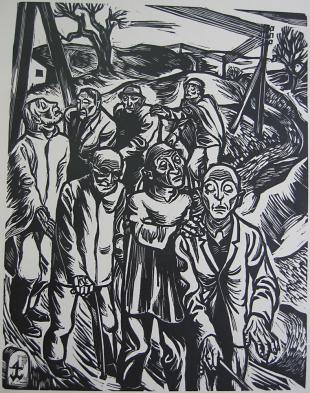
Johannes Wohlfarht
1933
The rise and fall of the Expressionist woodcut
Adventures in the Print Trade
_______________________
What We Owe to Each Other Part 2
An Interview with David Graeber
David V. Johnson
boston review
(....)
... At one point I wrote something for New Left Review, a theory piece that they actually commissioned from me. It’s very ironic because they then rejected it before allowing me to respond to the criticisms, but the major criticism was—they couldn’t quite say it, they came very close—“You’re Anglophone. You’re writing in English. People who write in French, German, and Italian can propose theories; people who write in English can comment on those theories. You can’t just make up a theory of alienation. That’s absurd.” So there are these codes like that.
Another one is: “You can’t write a grand, sweeping, historical, theoretical work anymore. Especially not if you’re English, maybe you can do it if you’re French.” But even that aspect of it tends to be ignored.
So there’s a sense that in the late nineteenth century or late twentieth century we could do those “The Decline of the West” papers, histories of religions, and that kind of worked. But nowadays we don’t do that anymore.
So I think insofar as I violated intellectual taboos, it wasn’t so much in how I presented it in a way accessible to the public, but it’s that very idea that we can’t ask the big questions anymore....(more)
_______________________
The Open Road and the Traffic Stop:
Narratives and Counter-Narratives of the American Dream
Nancy Leong
_______________________
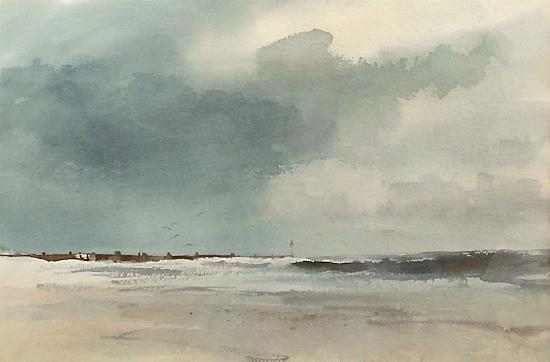
Halftide at Waxham
Edward Seago
b. March 31, 1910
_______________________
An aside, or: modernism's despair
Matthew Flanagan
Landscape Suicide
Cervantes' reader is idle, desocupado, one who is not occupied, has nothing better to do. Unlike the listener to Homer or the reader of Dante, who listens or reads so as to have reaffirmed the order of things, how things are, this reader is imagined as turning the pages of a printed book in the solitude of his or her own room, simply in order to pass the time. And the author too, though he would like to be the inspired spokesman of the community, recognises that he is only a solitary individual, 'filled with inconstant thoughts never imagined by anyone else', and therefore with no authority for what he says and no access to the truth or to a Muse who would herself have access to it. In such a situation the worst possible thing would be to imagine or pretend that he did; his only hope is to accept that this is the way things are and to make the best of them. In that way, perhaps, he may become the spokesman for a new community of solitary individuals.
—
Gabriel Josipovici on the preface to Don Quixote, in What Ever Happened to Modernism?

photo - mw
_______________________
Dreamwood
Adrienne Rich
In the old, scratched, cheap wood of the typing stand
there is a landscape, veined, which only a child can see
or the child's older self, a poet,
a woman dreaming when she should be typing
the last report of the day. If this were a map,
she thinks, a map laid down to memorize
because she might be walking it, it shows
ridge upon ridge fading into hazed desert
here and there a sign of aquifers
and one possible watering-hole. If this were a map
it would be the map of the last age of her life,
not a map of choices but a map of variations
on the one great choice. lt would be the map by which
she could see the end of touristic choices,
of distances blued and purpled by romance,
by which she would recognize that poetry
isn't revolution but a way of knowing
why it must come. If this cheap, mass-produced
wooden stand from thc Brooklyn Union Gas Co.,
mass-produced yet durable, being here now,
is what it is yet a dream-map
so obdurate, so plain,
she thinks, the material and the dream can join
and that is the poem and that is the late report.
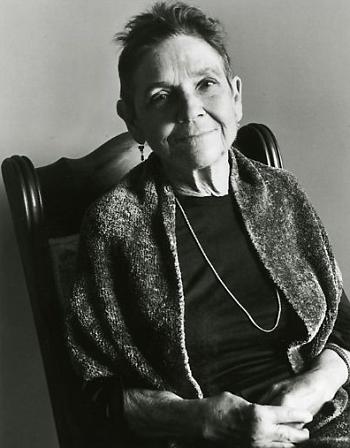
Adrienne Rich
Photo: Robert Giard / W.W. Norton & Company
1929 — 2012 Adrienne Rich at the Poetry Foundation and PennSound
_______________________
The Poetry Of Thought
From Hellenism to Celan
George Steiner
reviewed by Ben Hutchinson
... there is a profound intellectual humility in Steiner’s respect for the “tradition”, discernible in his repeated insistence that the critic is but a postman, delivering letters from the poets. As he asserts in his autobiography, Errata (1997), “no hermeneutic is equivalent to its object”.
That such a broad perspective seems increasingly elegiac is not the least of Steiner’s concerns. In an age of specialists, the Arnoldian ambition to encompass “the best which has been thought and said” risks seeming outdated, if not naive. Yet, in one important sense, Steiner’s new book takes Arnold’s definition of culture at its word. For it is arguable that the most important term in this definition is its most innocuous: how much weight does the conjunction “and” carry in bridging the gap between thought and speech? What is the force of this conjunction in the Western tradition? If the relationship between philosophy and poetry underlies much of Steiner’s work, The Poetry of Thought tackles the Arnoldian “and” head-on....(more)
_______________________

Heikki Willamo
extracts from
‘A year in the forest’
Heikki Willamo
Translated by Hildi Hawkins
books from Finland
Spring
Staying put makes you notice slow changes. How snow melts and the pale forest floor gradually turns green. How the ice darkens and the edges of the ponds open up, how the meltwater grows around the stones in the water. When you have a base and a home, it becomes the centre of your existence and thus the focus of the whole forest. Unhurried sitting, making food, brewing coffee and sleeping with open senses brings the life that surrounds you under your skin.
(....)
I begin to call my space metsänpeitto, forest cover. Once, it was something frightening, in which you became the prisoner of the forest and its supernatural powers. You found yourself in an unfamiliar state of being and could not contact anyone who was trying to find you, even if they walking beside you. They, on the other hand, saw you, under your forest cover, as a stone or a tree-stump and could not hear your cries for help.
The world changes, beliefs and myths crumble as things receive their explanations. I am not forced under the cover of the forest; it is a privilege to be there. For me it is a tranquil, place that simplifies and clarifies things....(more) _______________________
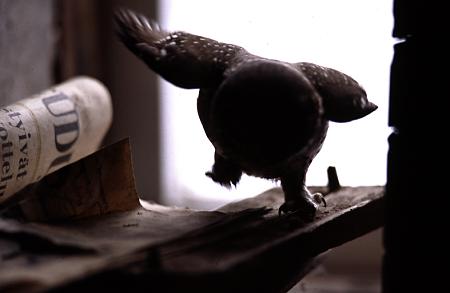
The last visitors. Life in abandoned houses
Heikki Willamo
_______________________
I Dream I'm the Death of Orpheus
Adrienne Rich
I am walking rapidy through striations of light and dark thrown under an arcade.
I am a woman in the prime of life, with certain powers
and those powers severely limited
by authorities whose faces I rarely see.
I am a woman in the prime of life
driving her deat poet in a black Rolls-Royce
through a landscape of twilight and thorns.
A woman with a certain mission
which if obeyed to the letter will leave her intact.
A woman with the nerves of a panther
a woman with contacts among Hell's Angels
a woman feeling the fullness of her powers
at the precise moment when she must not use them
a woman sworn to lucidity
who sees through the mayhem, the smoky fires
of these underground streets
her dead poet learning to walk backward against the wind
on the wrong side of the mirror
1968
from The Will to Change

Alberta Oil Sands
Fort McMurray, Alberta
photo by Edward Burtynsky
Canadian Sunset
Tom Clark
_______________________
Murmurs Of The Earth From This Land
Muriel Rukeyser
posted at The Great Leap Sideways
Murmurs from the earth of this land, from the caves and craters,
from the bowl of darkness. Down watercourses of our
dragon childhood, where we ran barefoot.
We stand as growing women and men. Murmurs come down
where water has not run for sixty years.
Murmurs from the tulip tree and the catalpa, from the ax of
the stars, from the house on fire, ringing of glass; from
the abandoned iron-black mill.
Stars with voices crying like mountain lions over forgotten
colors.
Blue directions and a horizon, milky around the cities where the
murmurs are deep enough to penetrate deep rock.
Trapping the lightning-bird, trapping the red central roots.
You know the murmurs. They come from your own throat.
You are the bridges to the city and the blazing food-plant green;
The sun of plants speaks in your voice, and the infinite shells of
accretions
A beach of dream before the smoking mirror.
You are close to that surf, and the leaves heated by noon, and
the star-ax, the miner’s glitter walls. The crests of the sea
Are the same strength you wake with, the darkness is the eyes
of children forming for a blaze of sight and soon, soon,
Everywhere, you own silence, who drink from the crater, the
nebula, one another, the changes of the soul.
— from The Collected Poems of Muriel Rukeyser.
_______________________

photo - mw
_______________________
Not Beyond All Conjecture
John Ashbery
Wave Composition.
Oblivion scattereth her poppy, and besides
it’s time to go inside now,
feed the aggressive pets, forgive our trespasses
for trespassing against us.
Other times
monotony is like a cave, the air is fresh,
tedium tonic.
We lie in a museum of helpful objects,
leaning toward the accomplishment of a small,
complicated task, like sailors in rigging.
Something no American has yet achieved.
_______________________
“…by writing we lose control…”
Christopher Higgs
HTMLGIANT
An automatic disconnect.
The impossibility of language abutting the desire for language.
Proof that we want what we cannot have.
_______________________
To be of use: The Art Kettle by Sinéad Murphy
Stephen Mitchelmore
this space
(....)
Art appreciation sometimes appears less a process of discovery and growth than an unsatisfying, moth-like fluttering between partial illuminations. Why this oscillation in the dark?
Sinéad Murphy’s dissatisfaction with art is of a different order entirely and she has no hesitation in providing an answer: by suppressing the question of what art is for, contemporary art colludes with liberal democracy in making “social, cultural and political life free of ... unpredictable, revolutionary capacities.” Moreover, this collusion is not a failure of certain contemporary artists or movements but its very mode of being:
“the manner in which art is constituted in our society – that is, what we understand art to be and to do, and the value we attribute to what art is and does – operates primarily as a mode of control.”
The Art Kettle's case is worth setting out in as much detail as a brief review allows in order to let its unusual resistance to art show through. ...(more)
_______________________

photo - mw
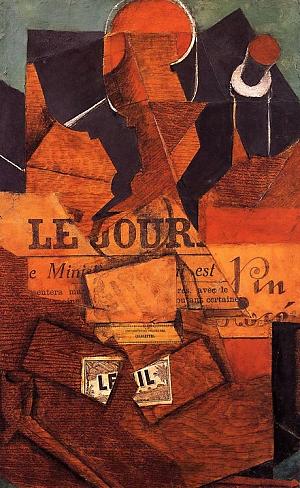
Tobacco, Newspaper and Bottle of Wine
1914
Juan Gris
b. March 23, 1887
_______________________
The Flesh of Words: The Politics of Writing
Jacques Rancičre
Trans. Charlotte Mandell
google books
So a strange game is played between words and their body. Since Plato and the Cratylus it has been understood that words do not resemble what they say. That is the price of thought. Any resemblance must be resisted. But, by identifying this resemblance with the poetic lie, Plato gave himself too easy a task. For poetry and fiction have the same demand. That is what Mallarrne says, correcting his crarylian reveries of an amateur philologist with the poet's rigor. If chance had not made the very sound of nuit [night] light and that of jour [day] dark, verse would not exist, which rewards the faults of language, and makes only the absent one of all flowers rise up.
But doesn't this condemnation of resemblance, which modern poetry has inherited from ancient philosophy, itself settle the question too quickly? For there are many ways of imitating, and many things that can be resembled. And when it was said that sound did not resemble meaning, or that a sentence was like no object in the world, only the most obvious of the doors through which words can go toward what are not words has been closed. And the least essential, too. For it is not by describing that words acquire their power: it is by naming, by calling, by commanding, by intriguing, by seducing that they slice into the naturalness of existences, set humans on their path, separate them and unite them into communities. The word has many other things to imitate besides its meaning or its referent: the power of speech that brings it into existence, the movement of life, the gestures of an oration, the effect it anticipates, the addressee whose listening or reading it mimics beforehand: "Take, read!", "Reader, throwaway this book." If resemblance in painting is denounced, isn't that because it fixes all movements on one single plane? That indeed is what the criticism of [Plato's] Phaedrus definitively tells us when it denounces the vain portrayal of Logos presented by the silent letters of the script. The problem is not that the resemblance is unfaithful, but that it is too faithful, still attached to what has been said when already it should be elsewhere, near where the meaning of what has been said must speak. The written letter is like a silent painting that retains on its body the movements that animate the logos and bring it to its destination. The chattering silence of the dead letter blocks the multiple powers by which the Logos constitutes its theater, imitates itself to perform living speech, to travel the path of its oration, to become seed able to bear fruit in the soul of the disciple. And the entire text of Phaedrus is only the deployment of all the luxuries by which writing exceeds itself in the mime of living speech, of speech on the march that traverses all the figures of discourse in movement: walking around, dialogue, debate, parody, myth, oracle, prayer.
This is the theater that will be at issue here, the way a text gives itself the body of its incarnation to escape the fate of the letter released into the world, to mime its own movement between the place of thought, of mind, of life, whence it comes, and the place toward which it heads: a sort of human theater where speech [parole] becomes action, takes possession of souls, leads bodies and gives rhythm to their walk. It will be a question of that superior imitation by which language tries to escape the deceptions of imitation. The theater initiated by Socrates' stroll and Phaedrus' walk is really that of the excursions [sorties] of the word. But there are good and bad excursions.
_______________________
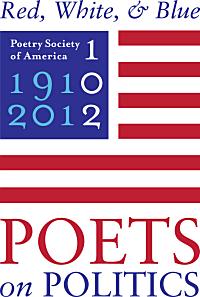
Red, White, & Blue
Poetry Society of America
200+ links on poets & poetry
Ron Silliman
_______________________
Blood Makes the Grass Grow
Stan Goff
Feral Scholar
(....)
When the story goes awry, when villagers are massacred without an operations order, or a black teen-aged young man is stalked and shot through the heart by a suburban gunslinger (who is not the police), we seek any other explanation except the one that says, “men are encouraged to want to kill.”(....)
The reason we can’t ignore these incidents, yet we can ignore the drone killings, Fallujah, cops killing unarmed black men, is because this society has become completely morally incoherent. We are a rotten culture, a dominator-male culture, adrift in an ethical cesspool of deracinated self-centeredness, programmed superficiality, and gratuitous violence.
We don’t want to believe it. That’s why these con artist Generals on NPR can get away with their prevarications. They are reinforcing our denial. They simply can’t say that their wars are moral abominations, that their wars are cause and effect in American gun culture embedded in our more general acquisitive and individualistic corruption, riding a stale narrative of frontier masculinity.
We are a Nietzchean nightmare....(more)
_______________________

NAP 2.4
Poetry and Fiction by Carrie Lorig, Kristin Lueke, Shawn Maddey, rob mclennan, Thomas Mundt, Tess Patalano, Joseph A. W. Quintela, Kayla Rizzo, Thomas Simmons, and Joshua Young.
_______________________
Versions
Tomas Transtromer’s Poems and the Art of Translation
David Orr
(....)
Transtromer, trained as a psychologist, has always been interested in the ways our personalities obscure as much as they reveal. “Two truths approach each other,” he writes in “Preludes” (translation by May Swenson), “One comes from within, / one comes from without — and where they meet you have the chance / to catch a look at yourself.” In this context, his heavy reliance on metaphor isn’t surprising. A metaphor insists on the similarity of its tenor and vehicle, but also declares their fundamental difference: after all, the metaphor itself would be unnecessary if its components were identical. These countervailing purposes become, in Transtromer’s hands, a way of holding together what he can and can’t say. As he puts it in Fulton’s translation of “April and Silence”: “I am carried in my shadow / like a violin / in its black case.” He balances these often startling juxtapositions with simple diction and generally straightforward syntax, making the complexity of his poetry a matter of depth rather than surface. His poems are small, cool fields dissolving into dreams at their borders.
This is exactly the sort of writing that tends to do well in translation, at least in theory. The plainer a poem looks — the less it relies on extremities of form, diction or syntax — the more we assume that even a translator with no knowledge of the original language will be able to produce a reasonable match for what the poem feels like in its first incarnation.
The problem is, simple can be complicated....(more)
_______________________

Pierrot with Book
Juan Gris
1924
_______________________
On Disobedience - Erich Fromm
If the capacity for disobedience constituted the beginning of human history, obedience might very well, as I have said, cause the end of human history. I am not speaking symbolically or poetically. There is the possibility, or even the probability, that the human race will destroy civilization and even all life upon earth within the next five to ten years. There is no rationality or sense in it. But the fact is that, while we are living technically in the Atomic Age, the majority of men--including most of those who are in power--still live emotionally in the Stone Age; that while our mathematics, astronomy,and the natural sciences are of the twentieth century, most of our ideas about politics,the state, and society lag far behind the age of science. If mankind commits suicide it will be because people will obey those who command them to push the deadly buttons; because they will obey the archaic passions of fear, hate, and greed; because they will obey obsolete clichés of State sovereignty and national honor.
(....)
Why is man so prone to obey and why is it so difficult for him to disobey? As long as I am obedient to the power of the State, the Church, or public opinion, I feel safe and protected. In fact it makes little difference what power it is that I am obedient to. It is always an institution, or men, who use force in one form or another and who fraudulently claim omniscience and omnipotence. My obedience makes me part of the power I worship, and hence I feel strong. I can make no error, since it decides for me; I cannot be alone, because it watches over me; I cannot commit a sin, because it does not let me do so, and even if I do sin, the punishment is only the way of returning to the almighty power. In order to disobey, one must have the courage to be alone, to err and to sin. But courage is not enough. The capacity for courage depends on a person's state of development. Only if a person has emerged from mother's lap and father's commands, only if he has emerged as a fully developed individual and thus has acquired the capacity to think and feel for himself, only then can he have the courage to say "no" to power, to disobey. A person can become free through acts of disobedience by learning to say no to power. But not only is the capacity for disobedience the condition for freedom; freedom is also the condition for disobedience. If I am afraid of freedom, I cannot dare to say "no," I cannot have the courage to be disobedient. Indeed, freedom and the capacity for disobedience are inseparable; hence any social, political, and religious system which proclaims freedom, yet stamps out disobedience, cannot speak the truth....(more)
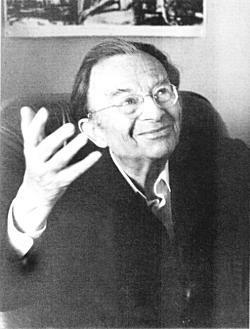
Erich Fromm
b. March 23, 1900
Photograph by Theo Goldmann
The fear of freedom
Erich Fromm
google books
To Have Or to Be?
Erich Fromm
google books
Erich Fromm Archive
_______________________
drafthorse
Wherever you are, work can be gratifying, satisfying, invigorating and redemptive. It can be brutal, boring and dangerous. It can be someone’s life or just a job. It can be embraced or avoided. It can be the thing just out of reach. It is at the heart of survival, at the root of an individual’s and community’s identity. We map history by the evolution of tools and our ability to use them. Our names have come from our ancestor’s occupations. Our country was once divided and bloody because of opposing philosophical beliefs about work and who should do it and at what price. Today the ability to work for fair compensation is still not guaranteed. Opportunities for work erode daily due to advancing technologies, disability, disinterest, disguised monopolies, hostile takeovers, immigration, globalization and migration—even of the jobs themselves. And yet, new enterprises abound. The editors of drafthorse are interested in work, or absence of work, as an avenue to explore how people both manifest and transcend their nature as physical and spiritual beings.
via new pages
_______________________
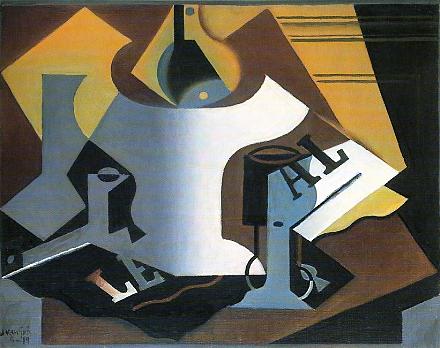
The Newspaper
Juan Gris
1919
_______________________
Four Poems
Timothy O’Keefe
conjunctions
The Outlying Counties and Then Some
(....)
So why this quaking in the trees, the winter sidewalks so quick to melt?
We were circumspect and felt every reason to be: some background
of the thoughts we thought then, laden with parasols or peacoats,
a clean bordering on magisterial that we had acknowledged years before
(we were conscious of doing so) made the rabbits tamer, the squirrels
vaguely harmonious. So much for the rapture of wheat fields, the ones
far enough out we’d have to pack a thermos and several spare tires
before the arrival on a scene of sparse trees, sparsely situated
in a forgiven landscape, the landscape itself a reflection
of the grace that gathered elsewhere. This was, of course,
long before the shortening of salutations,
mauve to midnight and slowly back again,
long before any of us could remember.
...(more)

Stanko Abadžić
1 2 3
_______________________
Freud’s Radical Talking
Benjamin Y. Fong
(....)
If psychoanalysis were simply a way of “curing” certain individuals of socially unwanted behavior, then I would have no problem with its disappearance. Similarly, if psychoanalysis were just a way for wealthy individuals to talk to one another about their lackluster existences, it might as well continue on its way to the dustbin of history. And if, God forbid, psychoanalysis has devolved into just another addition to the theory toolkit of academics in the humanities, someone ought to put it out of its misery now.
That said, I think there is something of great worth in the “talking cure” that would be troubling to see succumb to a cultural death.
(....)
From an outside perspective, the conversation is pointless. And indeed, most of the time it appears to be a waste. But in its disjunction with routine human interaction, it opens a space for our knotted interiors, so used to “having a point,” to slowly unravel. As each piece flakes off, it is examined and seen in relation to other pieces. After a long while, we gain what might be called, to borrow a term from Martin Heidegger, a “free relation” to these parts of ourselves and our world, such that the unmovable density they once comprised becomes pliable and navigable. Some key pieces appear and others vanish, but the puzzle is never complete. The aim of the conversation, however, is not completion, which short of death itself is an illusion, but the ability to change. This change involves neither the victory of the secondary process nor the liberation of the primary process but rather the opening of lines of communication between them.
We have become accustomed to temporarily putting aside our knotted interiors only to return to them as they were. “Reality will always be what it is; we can only hope for breaks every once in awhile.” This is a dogma both psychological and political. What Freud proposed, and what remains revolutionary in his thought today, is that human beings have the capacity for real change, the kind that would undo the malicious effects of our upbringings and educations so as to obviate the need for “breaks from real life,” both voluntary and involuntary....(more)
_______________________
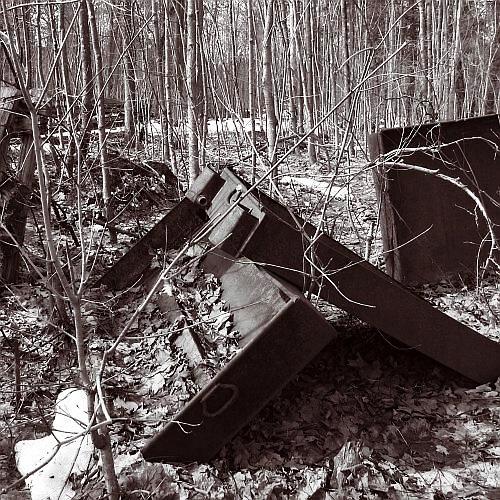
evaporating trays
photo - mw
_______________________
Eloquent silence
Ulrich Schmitz
Translated from the German by Allen Mundy
Being silent can be expected of us in one situation and unexpected in another, but it can also be incidental. It is unexpected, for example, when someone giving a speech loses their train of thought or when a confused person is at a loss for words. Silence is expected from an audience listening to a speech or from people in the reading room of a library. Silence is incidental when no one perceives it as silence; all speech is continually and almost imperceptibly interrupted by pauses of various lengths. These are the three forms of non-articulation, in contrast to silence in general. Silence as not-speaking is the absence of articulation, silence generally is the absence of sound. Human silence, silence as not-speaking, is thus the linguistic form of silence and is what concerns us here.
(....)
I will attempt to describe the relationship between language and silence without resorting to arbitrary, authoritarian distinctions between forms of silence which are profound or meaningful and others which indicate nothing more than a lack of thoughts or feelings. My description will nonetheless contain an ethical element. It seems to me that the only representation of the real gradation between the two, with all its simultaneous undertones and contradictory aspects, is to be found in literature. In the end, literature derives its force precisely from the attempt to map out unknown realms between language and not-language, between speaking and silence; these realms are filled in in the process. Orpheus is the western mythological archetype for this endeavour: how he brings order to mankind by singing and playing his lyre, how he is ultimately incapable of bringing Eurydice back from the underworld due to his turning round upon hearing her footsteps behind him, and how his head continues to sing and recite even after it is torn from his body by the scornful Maenads.
Putting aside for the moment artistic intensity, this conscious working with the literary forms of language, it must be said that grappling with silence is indeed a characteristic of all speech. The effort of the speaker namely, the perpetually self-repeating work of the mind to make articulated sound capable of expressing thought is precisely the effort to draw the dividing line between silence and speaking. Thus, silence becomes the reverse as well as an integral part of language. "Silence is a sentence", says Lyotard. I shall attempt to show that, not only does it divide and link other sentences, but it is also to be found inside of them and is, furthermore, inhabited by them as well....(more)
_______________________
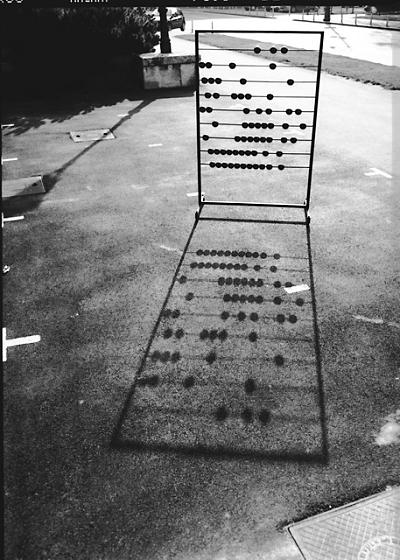
Stanko Abadžić
_______________________
A Grey Ecology is Needed Now More Than Ever
Drew Burk
ctheory
The time of an intellectual having an influence is over. Who has an influence? It is the climate.
—
Paul Virilio, Grey Ecology
As we stare down the aftermath of another natural disaster, Paul Virilio's words, unfortunately, ring as true as ever. Within a world that is in a headlong rush into synchronized global emotion, we can begin to understand his concept of the integral accident. Yesterday, the accident happened somewhere, it was relegated to one geo-location. Today, the accident is integral, it runs the show. It happens here and there.
(....)
As Hannah Arendt warned us so long ago, "miracle and catastrophe are two sides of the same coin". If we can begin to assess this tragedy that has spread through real-time networks, Paul Virilio's demand for a novel sort of ecology, a grey ecology for the man-made world of the dromosphere, can no longer be ignored....(more)
_______________________
Why Climate Change Will Make You Love Big Government
A Secret History of Free Enterprise and the Government That Made It Possible
Christian Parenti
(....)
When thinking about the forces of nature and the nature of infrastructure, a slightly longer view of history is instructive. And here’s where to start: in the U.S., despite its official pro-market myths, government has always been the main force behind the development of a national infrastructure, and so of the country’s overall economic prosperity.
(....)
Without constant government planning and subsidies, American capitalism simply could not have developed as it did, making ours the world’s largest economy.(....)
And here’s a curious thing: everybody more or less knows all this and yet it is almost never acknowledged. If one were to write the secret history of free enterprise in the United States, one would have to acknowledge that it has always been and remains at least a little bit socialist. However, it’s not considered proper to discuss government planning in open, realistic, and mature terms, so we fail to talk about what government could -- or rather, must -- do to help us meet the future of climate change. ...(more)
_______________________
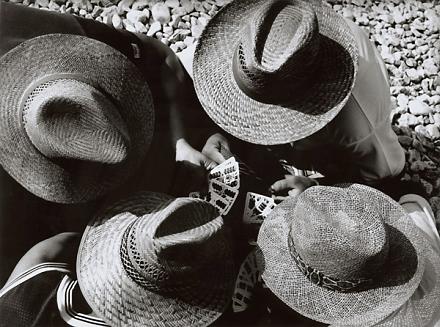
Stanko Abadžić
_______________________
Poetry
Ingeborg Bachmann
translation by Joan Harvey
A Kind of Loss
Ingeborg Bachmann
translation by Joan Harvey
Shared: seasons, books, and music.
Keys, teacups, the breadbasket, linens and a bed.
A dowry of words, of gestures, carried along,
used up, spent.
House rules followed. Said. Done. And always
the extended hand.
In winter, in a Viennese septet, and in summer
I have been in love.
With maps, in a mountain hut, on a beach
and in a bed.
A cult made up of dates and irrevocable promises,
enraptured before something, reverent over nothing.
( -- to the folded newspaper, the cold ashes, the note
on a piece of paper)
fearless in religion, for the church was this bed.
From the sea view came my unstoppable painting.
From my balcony I greeted the people, my neighbors, below.
By the open fire, in safety, my hair took on its deepest color.
The doorbell’s ring was the alarm for my joy.
It is not you I have lost,
but the world. ...(more)

photo - mw
_______________________
rerererereading
Helen DeWit
paperpools
(....)
Rereading is important for writers because people in the publishing industry constantly give advice couched in terms of helping the reader. If you are not only a reader, or even a rereader, but a rerererererererererereader, you know this is complete bollocks. "The" reader does not exist. The 9-year-old who read The Lion, The Witch and the Wardrobe 50 times in a year is genetically identical to the 54-year-old who has read Invisible Cities more times than she can count (if certainly not 50). The 16-year-old who read Pride and Prejudice as historical romance (I know Austen was forbidden, but really) is genetically identical to the 54-year-old who reads it for its social analysis, its savagery. (The 16-year-old would have had no interest in Goffman or Bourdieu; the 54-year-old sees Austen as their intellectual cousin.) As a rereader you can't be an amnesiac: you KNOW there were books you loved and outgrew, books you hated first time, admired 20 years later.
(....)
Books sometimes feel as though reread when they're not, because present at so many other readings: Pound gave me the impetus to read follow work I loved in translation in the original language, Proust gave me a way understanding worldliness, and they seem to be with me whatever book happens to be in my hand....(more)
_______________________
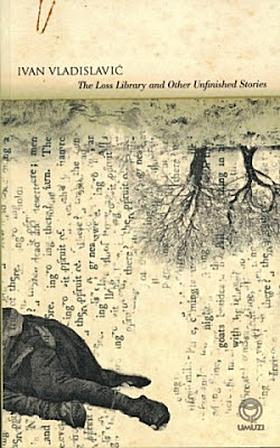
Literature is what we are lost in
David Winters reviews Ivan Vladislavic, The Loss Library and Other Unfinished Stories
3am
(....)
Fictive forms preserved in infinite space: the theme achieves its fullest expression in the central text of The Loss Library, ‘The Loss Library.’ Vladislavic’s library is both birthplace and grave, an archive where all unwritten books are assembled and catalogued. The account stands alone as an autonomous story: unlike the other texts in the collection, ‘The Loss Library’ lacks a model. Indeed, it enacts a crucial exception to the rule of the rest of the book: ‘The Loss Library’ is what enables The Loss Library to exist. It’s logical, too, that the two texts should share the same name, since the story described by ‘The Loss Library’ is also the story of how The Loss Library tells its stories. That is, this account of an archive of unwritten books is itself an account of the book in which it is written. The loss library is where all of The Loss Library’s incomplete works would end up, with the necessary exclusion of ‘The Loss Library.’ What’s more, as the librarian notifies the narrator:
‘When a reader opens one of these books it has consequences in others. Things are shaken up. Matters that appeared to be settled are reopened for discussion. The extent of the disruption depends on the book. There are certain slim volumes, the reading of which would hardly cause a ripple. And then there are others with the power to change everything. Entire books melt away under the reader’s eye, schools of imitators dwindle to nothing, towers of study guides topple over.’
The texts in the library are described as ‘lost’ books but also ‘potential’ ones. We know by now that the two terms are not mutually exclusive. But nor are books, written or not, isolable from each other. The librarian’s warning suggests a systemic connection between them, an intertextuality in which real works are reconfigured by their unreal archetypes. Literature is a holistic structure, more than the sum of its parts. Here that excess is expressed by the endlessness of the library, which we assume is an annex of another total library. And any actual book we can hold in our hands is only a point on an infinite line which leads back to the library. Thus, the loss library is precisely that place where literature may be perceived in the form of a line, not a point....(more)
.....................................................
Mouse Drawing
extract from The Loss Library and Other Unfinished Stories
Ivan Vladislavic
(....)
In the decade since then, I have forgotten exactly what was lost. The books that mattered were replaced long ago, and I soon learned to live without the half-formed fictions and copies of correspondence. But ‘Mouse Drawing’ will not rest. Hear it rustling now in the waste-paper basket. It wants to begin again....(more)
_______________________

Fields of Sawdust (Bolinas)
photo by blmurch
Buzz
Tom Clark
_______________________
An Example Of The Motif Of Harmful Sensation In Fiction
Christopher WunderLee
The Monarch Review
(....)
Like all metaphors, these were substantial, embellished, amplified versions of some truth, two stories tall maybe, generic mutts and regular felines, gigantic symbols. But of what, no one was certain. Of course, there were theories. “Nature is trying to tell us something,” cried headlines in the local newspapers that hadn’t yet went under, but not that many people read them so their warnings went unheeded. A woman in Centralia claimed to be a “nature whisperer”, in psychic contact with the ghost of a 2,000-year-old shaman from Papua who had “lost his pets”. The woman, who called herself Tara Forma, said this shaman told her people needed to be nicer to animals. The Organization for the Rights of Creatures All (ORCA) threatened to sue anyone who hurt any metaphors. The only successful litigation was against poets....(more)
The Monarch Review
via New Pages
_______________________

photo - mw
_______________________
Murder Is Not an Anomaly in War
Chris Hedges
We kill children nearly every day in Afghanistan. We do not usually kill them outside the structure of a military unit. _______________________
An Anarchist’s Reflection on the Political Economy of Everyday Life
Peter J. Boettke
Review of Austrian Economics, Vol. 25, No.1
Social Science Research Network
 The Dream
Ferdinand Hodler
1853 - 1918
_______________________
Teaching in Translation: Poet as Translator
Malena Morling
words without borders
(....)
I like to think of translating as a kind of catalyst for new and inventive ways of writing, as an indirect or sideways approach to the direct experience of writing poems. I like to think of it as analogous to the Taoist approach to happiness: if you move directly toward the target, you will miss it. Perhaps it is possible that our minds move too directly to our writing and therefore we often miss our poem in its utmost compelling state.
The Swedish poet Tomas Tranströmer has said about translation, “A poem is a manifestation of an invisible poem that exists beyond the conventional languages. Therefore, a translation of a poem into a new language is an opportunity to attempt to realize the original (invisible) poem."2 If that were the case, what would it mean? Would it mean that every moment of our lives here on Earth held a poem that we would be able to retrieve or translate into existence if we could only remain open enough and receptive enough to its presence?
This possibility suggests a fundamental kind of exchange, an exchange of gifts so to speak, poems as gifts, the giving and receiving of the world of images, and things, that is, in some ways at the heart of translation....(more)
_______________________

Johan Hendrik Weissenbruch
1824 - 1903
_______________________
Seer Blest
Sam Sacks on Frank Kermode
open letters monthly
(....)
St. Thomas and St. Augustine make frequent appearances in Kermode’s criticism, and he read them and bantered with them the way that most people do the sports page. He was himself a nonbeliever, but because he could give conditional assent to concepts like omniscience and immortality he could fluently translate these thinkers into the secular era and therefore mingle their ideas with those of contemporary theorists, even those as radical (at the time) as Jacques Lacan and Roland Barthes. Kermode practiced criticism during a phase of intense rupture in the academic world, when most literary scholars had divided into reactionary camps, contentiously alienated from each other, from the precepts of the past, and most of all from the reading public. Kermode’s genius was in traveling freely among these schools of thought, and even among the styles of writing, employing their competing theories but not being defined by them—and also subtly demonstrating their commonalities. He was the age’s great critical syncretist.
(....)
Kermode’s willingness to be proved wrong in any opinion is also the reason that, as many people have commented, his book reviews always seemed so serenely incontrovertible. Because he had no ideological agenda, there was no soft underbelly of irrational belief to attack. You had simply to face him on the merits of the arguments on the page. To do that, you had to know as much about literature as he did, which disqualified effectively everyone.
Yet no one understood better than Kermode that there is a difference between an argument being incontrovertible and it being true. Along with the provisionality of his approach—his ability to draw from the well of his passion for books without toppling into it—came the awareness that criticism is, at heart, a performance. Kermode’s writing is always challenging, but it is leavened by a spirit of shared entertainment, a tacit acknowledgment that interpretation is a kind of game—something, he notes, that the rabbis recognized “without for a moment supposing that what they were doing wasn’t serious; the most serious thing in the world, in fact.”
Kermode wrote criticism for no higher purpose than to perpetuate the lives of great works of art, for, as he wrote, “the medium by which all texts survive is commentary.” To that end he joined a nearly unrivalled knowledge of the Western canon with a playful lightness of thought. He could travel across colleges as well as across millennia, trying out ideas and then setting them within their historical contexts. He possessed a mind that could change in time, and that made his criticism as timeless as any we can hope to have....(more)
via Mark Thwaite
_______________________
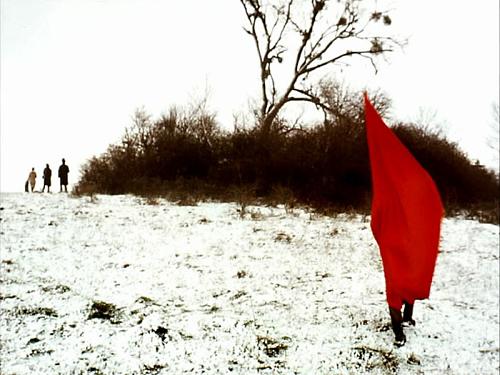
Game on Morel’s Hill
KwieKulik (Zofia Kulik, Przemyslaw Kwiek)
Filmoteka
Museum of Modern Art in Warsaw
Polish visual artists of the 20th and the early 21st century
_______________________
Too Smart to Fail
Notes on an age of folly
Thomas Frank
Baffler 19
... what rankles now is our failure, after each of these disasters, to come to terms with how we were played. Each separate catastro- phe should have been followed by a wave of apologies and resignations; taken together— and given that a good percentage of the pundit corps signed on to two or even three of these idiotic storylines—they mandated mass firings in the newsrooms and op-ed pages of the nation. Quicker than you could say “Ahmed Chalabi,” an entire generation of newsroom fools should have lost their jobs.
But that’s not what happened. Plenty of journalists have been pushed out of late, but the ones responsible for deluding the public are not among them. Neocon extraordinaire Bill Kristol won a berth at the New York Times (before losing it again), Charles Krauthammer is still the thinking conservative’s favorite, George Will drones crankily on, Thomas Friedman remains our leading dispenser of nonsense neologisms, and Niall Fer-guson wipes his feet on a welcome mat that will never wear out. The day Larry Kudlow apologizes for slagging bubble-doubters as part of a sinister left-wing trick is the day the world will start spinning in reverse. Standard & Poor’s first leads the parade of folly (triple- A’s for everyone!), then decides to downgrade U.S. government debt, and is taken seriously in both endeavors. And the prospect of Fox News or CNBC apologizing for their role in puffing war bubbles and financial bubbles is no better than a punch line: what they do is the opposite, launching new movements that stamp their crumbled fables “true” by popular demand.
The real mistake was my own. I believed that our public intelligentsia had succumbed to an amazing series of cognitive failures; that time after time they had gotten the facts wrong, ignored the clanging bullshit detector, made the sort of mistakes that would disqual- ify them from publishing in The Baffler, let alone the Washington Post.
What I didn’t understand was that these were moral failures, mistakes that were hard- wired into the belief systems of the organizations and professions and social classes in question. .... .....................................................
The Return of the Baffler: An Interview with John Summers
LA Review of Books
Interview: John H. Summers on The Baffler
Robert Birnbaum
identity theory
The Baffler

Crushed timbers
Gould and Curry Mine
1868
Timothy O’Sullivan
1840 - 1882
1 2
_______________________
Six Gymnopédies
Scott Garson
conjunctions
Huntsville
Age is a costume that’s forced on a man. It fits poorly, but few people see. I have been freed. My son in Portugal. My Elsa, twenty years gone. The streets in pinprick drizzle have as a locus my closing hand, my tuberous knuckles, and I can sit by the lake and be fine for a sweep of the clock. Later I stand. Across Monroe Street from here, the orchestra holds a rehearsal. You can hold in your mind—in pattern and form, and even in many particulars—a thing like Finlandia, by Jean Sibelius. To hear it again, however. To be in its space. To have your cells collude with its magisterial rise.
...(more)
Scott Garson edits w i g l e a f : (very) short fiction
_______________________
Wittgenstein Jr to the deck chairs
spurious
His teaching. He sits on his plain wooden chair, and we sit in our deckchairs. He sits upright, and we are almost lying down.
He thinks with a clear head, speaking in clear English with a hint of a German accent, and we listen with our cloth ears, understanding nothing.
Does he think we understand? Does he believe that we're following him? Does he really Guthrie is avidly taking notes, and not drawing cocks? Does he really believe Benwell is concentrating, his eyes closed behind his sunglasses? Can he see Doyle playing Tetris on his mobile phone?
(....)
We know we'll grasp nothing, take nothing away. We know we'll learn nothing, and that we are unteachable. We know we cannot approach his thought, nor his way of thinking. We know that, amidst us, he is also far from us. We know his distance from us; we feel it; it is what repels us, but also what draws us to him.
We know something important might be happening in these lectures. We know posterity demands something of us. We know we should keep notes, remember. We know that posterity is relying on us to take notes and remember. We know that someday we will write memoirs of this time. We know that we will be asked about our memories, and that we will dine out on our memories. We know that wide-eyed youths, youths like us, in twenty years time, will ask: Were you really taught by Wittgenstein Jr?
We know these things, but we know something else, too. That there will come a time when youths like us will not ask these questions. That a time will come when no one will ask what we remember, and the name, Wittgenstein Jr, will fall into obscurity. No one will publish our notes. We won't even keep notes; we're incapable of that. We don't understand; we can't concentrate. We can't follow his train of thought. That much is clear. But who among us will write what he says down? Who, when we know posterity will barely care for Wittgenstein Jr?...(more)
_______________________
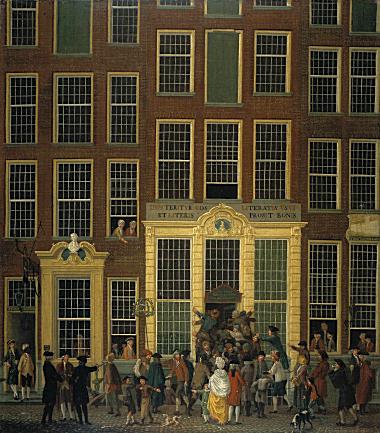
The Bookshop and Lottery Agency
Isaak Ouwater
1748 - 1793
_______________________
From A HalfMan Dreaming, Book I
David Matlin
presented by Jerome Rothenberg
Exit Chino
I was used to seeing the factories. The scrubbed clean ones with low roofs where you needed a great grandmother from the American Revolutions to get work clearance. You got to put together torpedoes and missiles with atomic and nuclear warheads, take your time, microtune those fuckers so that they wouldn't even leave a stain. You could come home to your girlfriend. Have her wrap her legs around your back in the back seat of your Dodge Hemi and know she couldn't even begin to ask how your day went, that it was "Top Secret" installing gyroscopes the angular rotation of your nighttime hours and their pitch yaw and roll. Maybe you could do it eight hours a day, get to love to drop DMT, tell your head it steadied your fingers, sing the same little rodent song that Annette or Darlene sang and have that girl friend strap on a Mickey Mouse hat, suck and pull your nipples raw, stretch your anus with her hungry wanting fingers, and if you let it become an image where would its eating stop or begin what with those industries surrounding the death of being being another gold rush, and moving between that flow of money and how it could customize a car, buy in-board race boats with blown injected Chryslers and the Northwest wastes of the Mekong Delta where cults and prophets seemed to appear out of a nowhere equal to any Southern California parking lot, the mutual power of incantation licking, calling everyone to a passage and whether it was beyond cure only death's part of the rescue's price would tell. Ripened. Who can be ripened as the moon is eaten. And may never come back. Warped maze of swollen earth one finger tall. Hell particularly stinks they thought. In all their scrolls the dead in the land of the dead are represented by a fart. And there the most beautiful jewelry to be worn are the freshest eyes of the dying.
And the witch in my world was a plane. ...(more)
_______________________
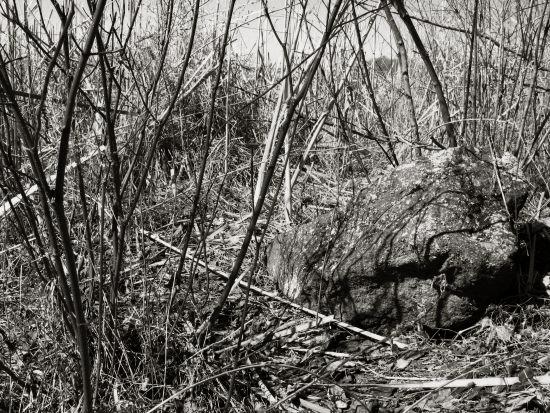
photo - mw
_______________________
Mithraic and Poor Summer in Franconia
By W. G. Sebald
translated from the German by Iain Galbraith
Mithraic
Nine thousand nine hundred
and ninety-nine years
Zarvan murmured
to get a son
And now his descendants
are flogging off
the houses of heaven
and the five coasts of the earth
With his sea-goat ready
for departure the mythologist
beholds once again
the shattered world egg
...(more)
Guernica
|

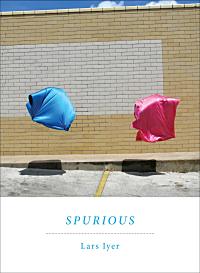


 The Age of Briggs & Stratton
The Age of Briggs & Stratton






























